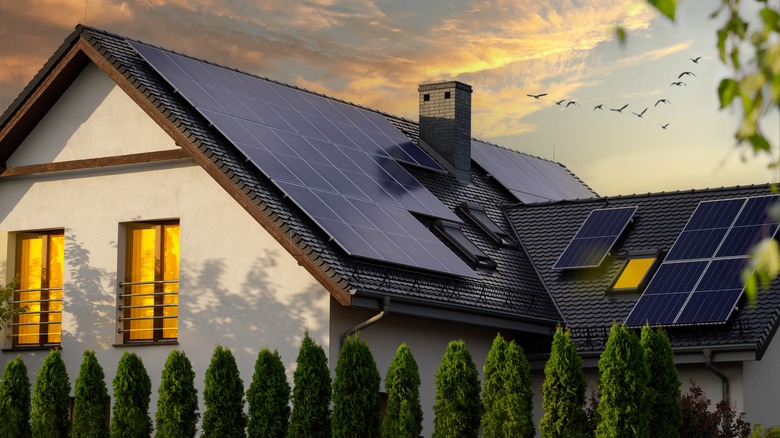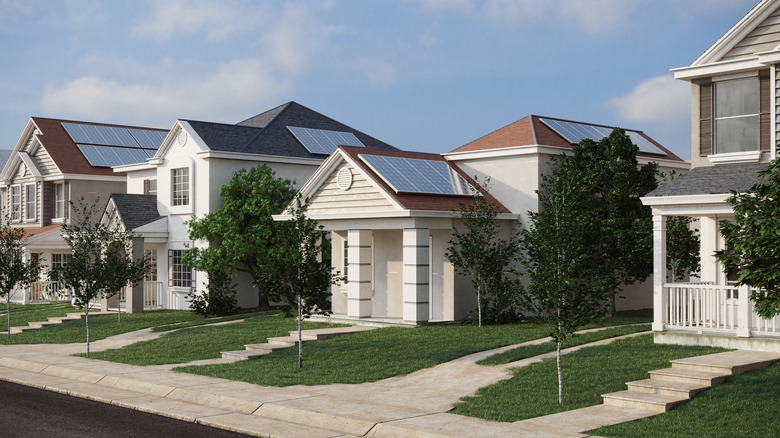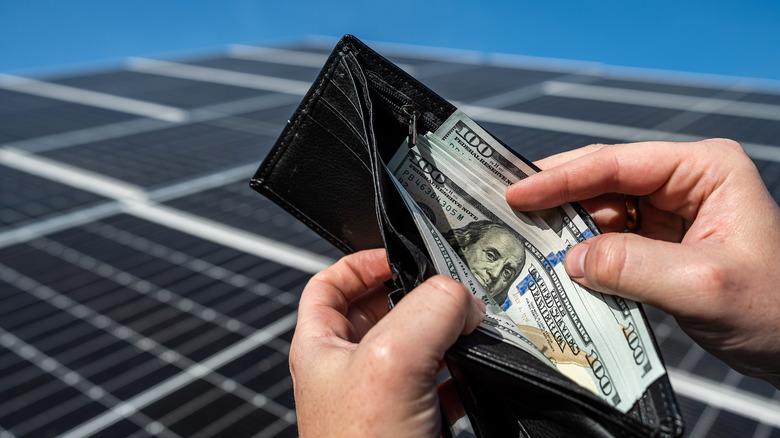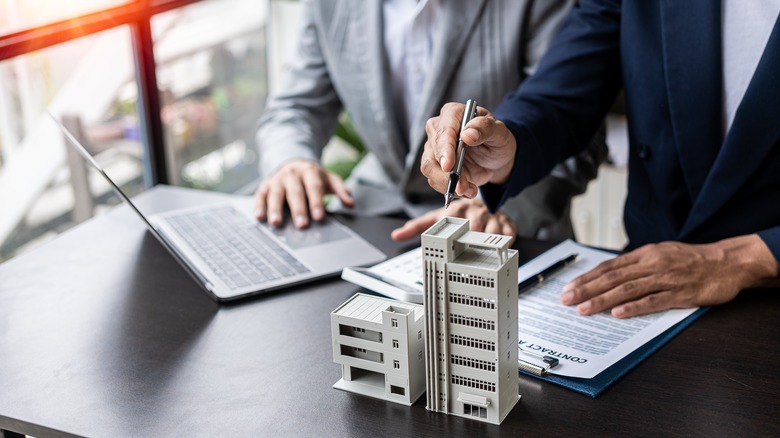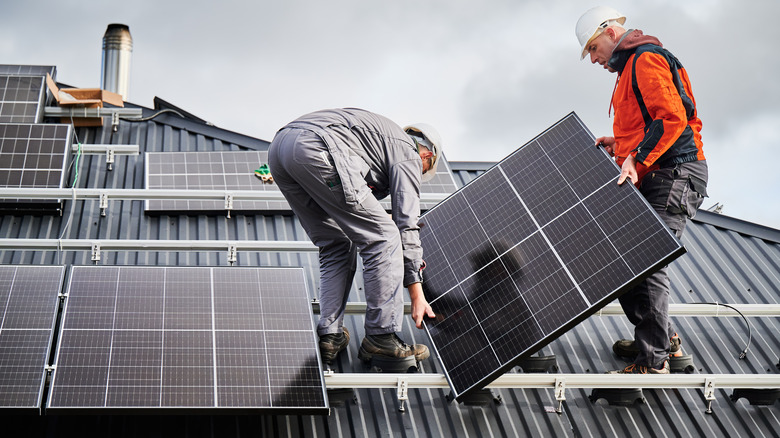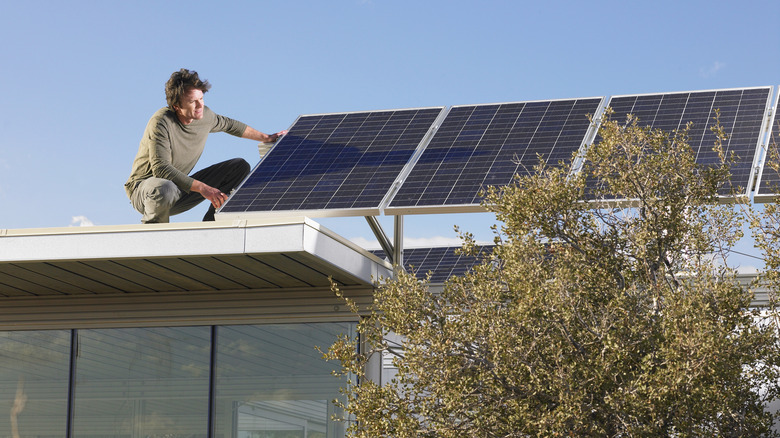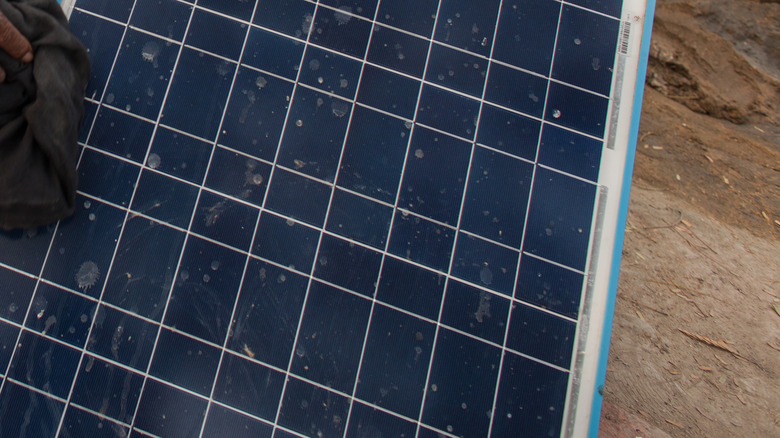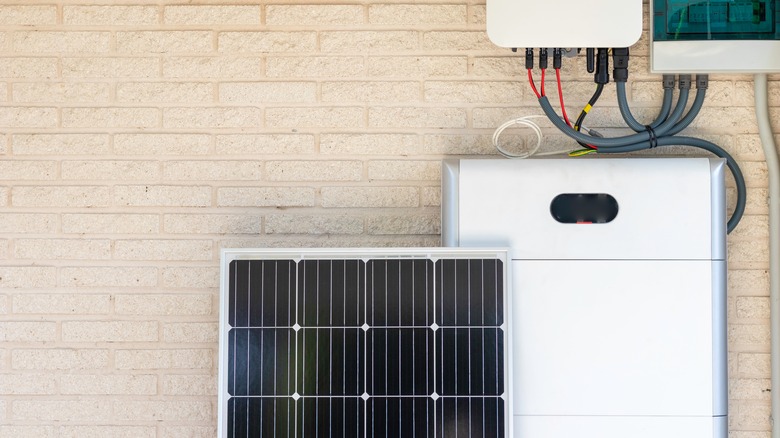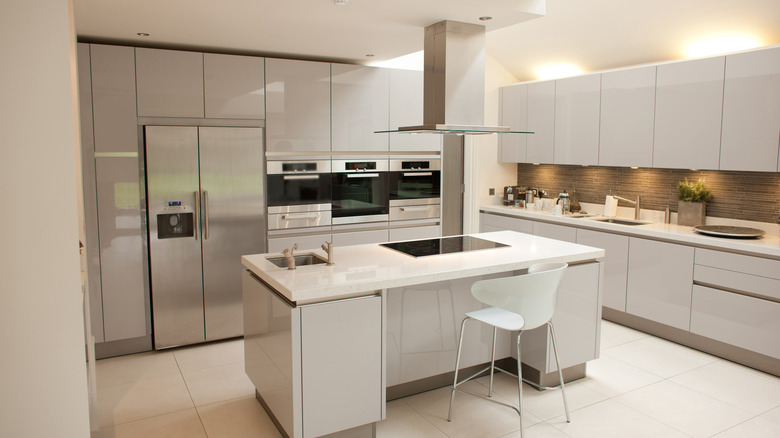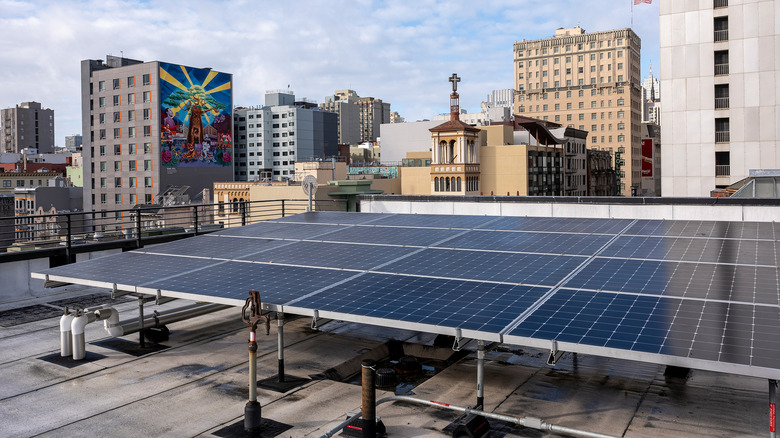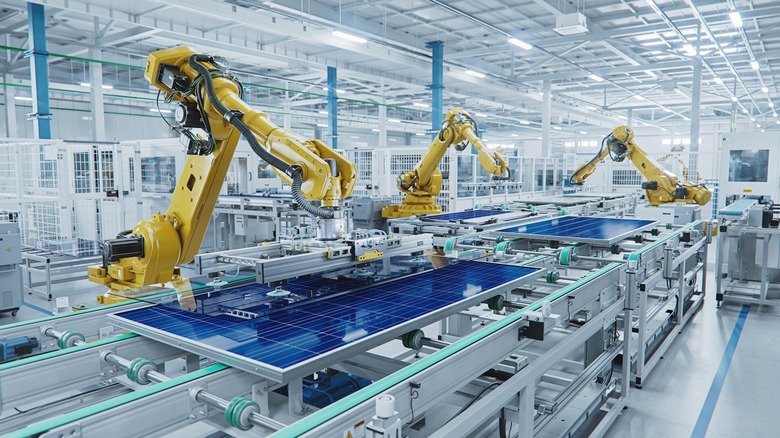10 Things You Need To Know Before Installing Solar Panels On Your Home
Electricity is a crucial part of daily life. We rely on it to power appliances, and many use electricity to heat their homes and cook food. You can't even search the internet or play video games without electricity. Almost everyone pays for electricity, but how many consider where it comes from?
Usually, electricity is sourced from a station or plant that uses natural gas, nuclear fuel, or the power of rushing water. Since companies own and run these energy farms, most people need to pay them to receive some of the generated juice. The exception to this rule is solar energy via solar panels. Granted, plenty of power companies have devoted large tracts of lands to "solar farms" that suck up sunlight as a form of renewable energy. But since you can attach solar panels to your house and use the electricity they generate for your own purposes, solar mirrors are one of the few electrical generators that don't force users to pay a recurring premium. That isn't the same as saying solar panels are free, though (or, for that matter, a universally viable alternative).
Before you can install solar panels, you need to consider numerous factors. Do you have enough money to purchase them? Will your city even permit it? Could you save as much money by just swapping all the lightbulbs in your house with more efficient ones? Here are just a few of the questions you need to ask yourself before you start down the road to solar power, because it ain't the renewable energy utopia you might think it is.
Why you want solar panels
Before we discuss the pitfalls on the road to solar panel ownership, it's a good idea to delve into the reasons why anyone would want solar panels in the first place.
Solar panels provide numerous benefits, the most obvious of which is they save money because users can source most (or in some cases all) of their electricity from panels mounted on their roofs. In fact, depending on how much electricity your solar panels generate, some energy companies might pay you to use your surplus electricity or give you credit that can be used for days when your solar panels don't cut it. This system, known as net metering, is far from guaranteed, but when it's available, it's yet another incentive to go solar.
Like other household upgrade projects, solar panels also increase the value of your home. According to the National Renewable Energy Laboratory (via Forbes), solar panels raise your house's value by $20 for every dollar they save you on electricity. This isn't that surprising since houses that reduce the recurring costs of electricity bills are highly prized. After all, the less you spend on energy costs, the more you can spend paying off your mortgage.
These are only a few of the reasons someone might consider installing solar panels. While in use, solar mirrors produce fewer pollutants than many other electricity generators and are thus environmentally friendly. But let's be honest here: Many people install solar panels because they want to save money on energy bills. Whether it's for the environment or your bank account, solar panels are an investment.
They're so expensive, you might need financial help
The expression "it pays for itself" describes items that might have large upfront costs, but the cash they help you save will add up and eventually exceed what you initially paid. Solar panels might save you a ton of money, but only over a long period of time — too long for many people.
The average cost of a solar panel is no drop in the bucket. Prices vary depending on the type of solar panel, who's installing it, and how many you're buying. In 2022, the average solar panel system cost $24,000, but as of 2024, prices have dropped to a more affordable average of $12,700. However, that is still more than most people can pay off in one go, especially since the "pay for itself" factor takes an average of 10 years to kick in. Government incentives might decrease or increase this wait period.
If you purchase solar panels, you are eligible for federal solar tax credits. However, even with this boon, many people find it difficult to purchase solar panels outright. Fortunately, we live in an age of alternate payment methods. Plenty of companies offer financing options that let you pay as you go and loan programs that front you money that you pay off. Some solar panel installers also provide leasing systems. While these are generally more affordable, you are merely renting solar panels while leasing them, so you can't collect any solar tax credits.
It's one thing to calculate how much money you will save on energy bills via solar panels, and another thing entirely to calculate how much they will cost you up front. Not all purchase or rental plans are equal, so pick the one that is best for your wallet.
Installing a solar panel isn't always up to you
In 2018, California's Energy Commission mandated that starting in 2020, all new houses and condos would be built with solar panels. That's fine for upcoming buildings, but what about homeowners in preexisting houses who want to install solar power? Then it's a case-by-case situation, and the same is true everywhere.
Depending on where you live, you might require a permit before you can install solar panels. For instance, homeowners in New York City and across California's San Bernardino County need solar panel permits, but most people in New Jersey can add solar mirrors to their houses without one – so long as installations meet local building codes and zoning regulations. However, this lax law doesn't apply to people in historic districts and conservation areas. Regardless of where you live, if you rent a house or apartment, you also need to seek permission from a landlord to install solar panels. Failing these criteria, you can always buy portable solar panels.
Even if you can obtain a solar panel permit, you still need to consider insurance costs and taxes. Many home insurance contracts cover solar panels, but sometimes you have to purchase a separate policy. And if you do, make sure it covers wind and hail damage, as they are the bane of all solar panels. Moreover, depending on where you live, you might be entitled to solar property tax exemptions, solar sales tax exemptions, or both. Or neither, as is the case in states such as Idaho, Nevada, Wyoming, and Pennsylvania.
Always double-check the math involved. Even if you have to pay extra after installing solar panels, you might be able to afford them — and have some money left over — with all the money you save on electricity.
Solar panels rely on roofs for more than just real estate
Since solar farms are huge (one of the world's largest has 500,000 panels), they are generally planted in open areas with minimal shade. This is not tenable for the average private panel owner, so they generally place solar mirrors on rooftops. But before you do so, you need to ensure your roof is up to the task.
When planning out panel purchases, determine the shape and size of your roof. Every square foot of solar cells generates approximately 15 watts of electricity, so you need between 200 to 1,000 square feet of space to properly power your house. The direction your roof faces is another factor. Since the equator receives the most sun on the planet, general consensus states solar panels should try to face it. If your roof slopes to the East or West, you might need to spend more money on more panels to make up for that inefficiency.
Perhaps the most important element to consider is your roof's age. Since solar panels are guaranteed to last at least 25 years, you have to make sure your roof will hold up under the additional weight for the next several decades. If your roof needs replacing soon and you are thinking of going solar, might as well bundle the installations together. After all, roof replacements are expensive (around $10,000), and if you have solar panels installed, removing and reinstalling them during the process is only going to increase that fee, far more than just adding solar panels after a fresh roof replacement.
The roof isn't just a place where you situate solar panels; once the panels are installed, they are symbiotically linked to your roof. A happy and strong roof makes for happy and strong solar panels.
You don't want to DIY installation
Admittedly, this article's title is a bit of a misnomer. If you're looking to invest in solar power, you definitely want a solar panel installed — but you don't want to be the one to do it.
Like many electronics, solar panels come with warranties that guarantee they will work as advertised. Since solar panels are designed for extensive round-the-clock use, their warranties are good for anywhere between three to 25 years, and companies will repair or replace solar panels as needed. However, this only applies to solar panels that were installed by licensed professionals. If you try to install solar panels by yourself, you run the risk of voiding your warranty.
DIY installations also carry numerous other risks, most of which are associated with the pitfalls of improperly installing anything on a roof. For instance, solar panels are normally able to withstand gusty winds thanks to their racks, but if you don't know what kinds of racks to use and how to set them up, your solar panels could literally blow away. Plus, standard solar panel installation includes waterproofing and flashing, but only when installed by professionals. If you forget to do that when installing solar mirrors on your own, water's going to get in. And the icing on the cake? When installed by trained individuals, solar panels don't affect your house roof's warranty, but if you DIY the installation, you run the risk of voiding that warranty along with the solar panel's.
Hiring a team of people to set up your solar panels might cost even more money on top of the cost of the panels themselves, but it provides peace of mind and a financial safety net.
Low-maintenance isn't the same as no-maintenance
The roof was invented to protect people from bad weather by forming a solid surface over our heads. But when solar panels are installed, since they go on top of roofs, they take on that role and all its responsibilities. That also means they need the same upkeep as roofs.
The dark secret of solar panels is that, like other electronics, they degrade over time and become less efficient. On average, solar panels lose 0.5% efficiency every year, although some sources put this performance decay as high as 3% per year. Since these changes are as slow as they are subtle, the average user probably won't notice them, especially when starting out. However, you can stave off the inevitable and possibly extend the life of solar panels with regular maintenance.
Since solar panels are solidly built, you don't have to worry about anything getting inside them, but you still have to keep their exteriors clean. Anything that can block or mar the surface, from dust and grime to falling debris, leaves less space for the solar cells to properly absorb sunlight, thus reducing efficiency. Washing solar panels with a water hose (or letting rainstorms do it for you) will do the trick. Using soap, on the other hand, can leave streaks that can potentially damage solar panels.
Ultimately, solar panels are a somewhat "set it and forget it" external addition. Once they're up on your roof, you have to worry about them as often as you do, well, your roof in general. But completely forgetting the well-being of your solar panels can cause problems, not unlike forgetting the upkeep of your roof.
You might also need a solar battery
Contrary to popular belief, you can't declare your independence from public electrical utilities just with solar panels. A bright and sunny day will give plenty of electricity, but even if it's enough to power all the lights and appliances in a house, what happens when the sun goes down, or when clouds block the sun? That's where storage solutions come in.
Solar batteries, as their name suggests, use solar panels to charge up. Or to be more specific, solar batteries collect the surplus electrical energy generated by solar mirrors but not used by household appliances, and save it for later. These batteries come in handy as they provide electricity you don't have to pay for when the sun is otherwise unavailable. And yes, solar batteries also supply power during blackouts so long as they are sufficiently charged.
Depending on the max capacitance and material used, you might need to install multiple solar batteries. These devices always add to the cost of solar panel installation, but the particular battery you pick can mean the difference between a $200 or a $14,000 additional charge. And if your local power company doesn't support net metering, solar batteries are a critical add-on since you need to use all the electricity your solar panels generate to prevent surplus energy from causing grid reliability problems.
It's better to have a solar battery and not need it than to need one and not have it. If you don't think you will generate too much excess electricity, go with one of the less expensive options.
Match your power requirements to the panel's output
Solar panels have the potential to solve many energy issues but are far from a turnkey solution. As with many things in life, a little bit of research goes a long way, and that goes double when your financial future can hang in the balance.
Before figuring out what solar panels you want to buy, first determine if you even need them. How much money can you save on your energy bill with more efficient light bulbs or appliances? Purchasing these items is somewhat expensive, but it is always cheaper than installing solar panels. Then again, efficient electronics can help you buy cheaper solar panels, too.
If you are set on purchasing solar panels, look into their power outputs and match them against the power you expect your house to consume. To calculate the latter, multiply the mean wattage of appliances by the average time they're active, and then multiply that by the percentage of energy you expect to lose to the system. Or you can just contact your local energy supplier. The solar panel you buy needs to either meet or exceed the calculated number, but you also have to take into account solar panel efficiency, since not all absorbed sunlight is converted into electricity. You might need to purchase more expensive solar panels than you initially thought, or alternatively replace your lightbulbs with energy-efficient ones and then supplement them with solar panels.
While calculating your energy needs will help you obtain the right solar panel for your lifestyle, quite frankly, depending on the math, you might discover that solar mirrors won't save you enough on electricity. It happens, but sometimes paying more for electricity is the financially responsible action.
Solar panels need to stay sunny side up
Solar panels can't work without sunlight. However, to maximize effectiveness, you can't just set them up and call it a day. You need to orient solar mirrors to get as much sun as possible, and even then, the globe won't always cooperate.
While some companies say you should make solar panels face east or west, as previously stated, most organizations agree you should orient panels to face the equator. Placing solar panels along this bearing maximizes sun absorption, so it probably goes without saying that if your roof is shaded by either trees or tall buildings, you won't get the most out of installed solar panels. The same is also true depending on your location.
Not every country in the world can rely on solar power. Due to factors such as geography or even infrastructure, the effectiveness of solar panels can fluctuate between states or even counties. To make up for this shortcoming, you could install more solar panels, but then you have to deal with the associated costs. And that's to say nothing of whether your roof is big or strong enough to support the additional solar cells.
Before you consider installing solar panels, always do your research. Look at solar maps and contact not only solar panel installation companies but also your local electricity provider. The more information you have, the better.
To lower your carbon footprint, you have to have a big one first
People purchase solar panels for a variety of reasons, usually because they want to save cash or rely on a power source that produces less pollution. However, the production of solar panels costs more than money. As they say, you can't make an omelet without breaking a few eggs, and solar panels are one heck of an omelet.
The photovoltaics in solar panels can be made out of several different materials, but silicon is by far the most common. While silicon is one of the most abundant elements on Earth, it's still difficult to process the material into solar panel cells. According to studies, each panel requires 600 grams of silicon. Plus, regardless of the main material, all solar panels utilize metals such as copper, silver, and lithium, which are significantly rarer and need to be mined. And of course, mining metals produces carbon emissions. But that's just the cost of sourcing materials.
Different solar panel component makeups require different manufacturing processes, each with their own environmental impact. The most efficient solar panels, monocrystalline silicon, are costly and cause the most pollution during production. Meanwhile, the least efficient panels, thin film, are comparatively inexpensive and produce fewer carbon emissions during manufacturing. That sounds like good news, but thin film solar panel production also involves the most toxic chemicals out of all solar panels. Moreover, not all countries have the same energy production and manufacturing emissions standards, so some nations will allow their solar panel plants to spew out more carbon than others.
Solar panels can help save the environment, but if we aren't careful, we might churn out so many that we will end up harming the environment instead.
Watch out for scams
No matter where you go or what you want to do, someone always wants to take advantage of you. They don't care if you want to save money or the environment by switching to solar; they only care about profiting off it.
Odds are either you or someone you know has received calls from telemarketers offering "free solar panels." Don't fall for their sales pitches. According to the founder of Grouphug Solar and the co-founder of Wildgrid, Krystal Persuad (via CNET), telemarketers are only looking for your information and will twist the truth to get it. The term "zero money down" is just marketing-ese for obtaining something via a loan or lease. That's not the same as receiving solar panels for free, but telemarketers don't want you to know that.
While you should never trust telemarketers, you have to be just as wary of solar company sales representatives, since they might exaggerate their solar panels' capabilities, or at least lie by omission, to make a sale. Every solar mirror's wattage is advertised through two ratings: the standard testing condition (STC) rating and the Photovoltaics for Utility Scale Applications Test Conditions (PTC) rating. STC ratings reflect solar panel outputs in idealized conditions, whereas PTC ratings, which were developed by the U.S. Department of Energy's National Renewable Energy Laboratory (NREL), are more realistic, i.e., lower. You can find PTC ratings with a bit of research. If a sales rep claims their solar panel's wattage differs from the reported PTC rating, they're probably trying to pull a fast one on you.
That's not to say everyone is out to get you if you're looking to invest in solar power, just that you should be vigilant.
